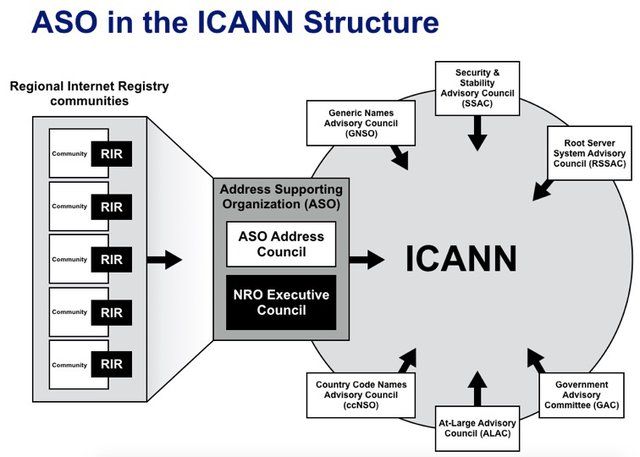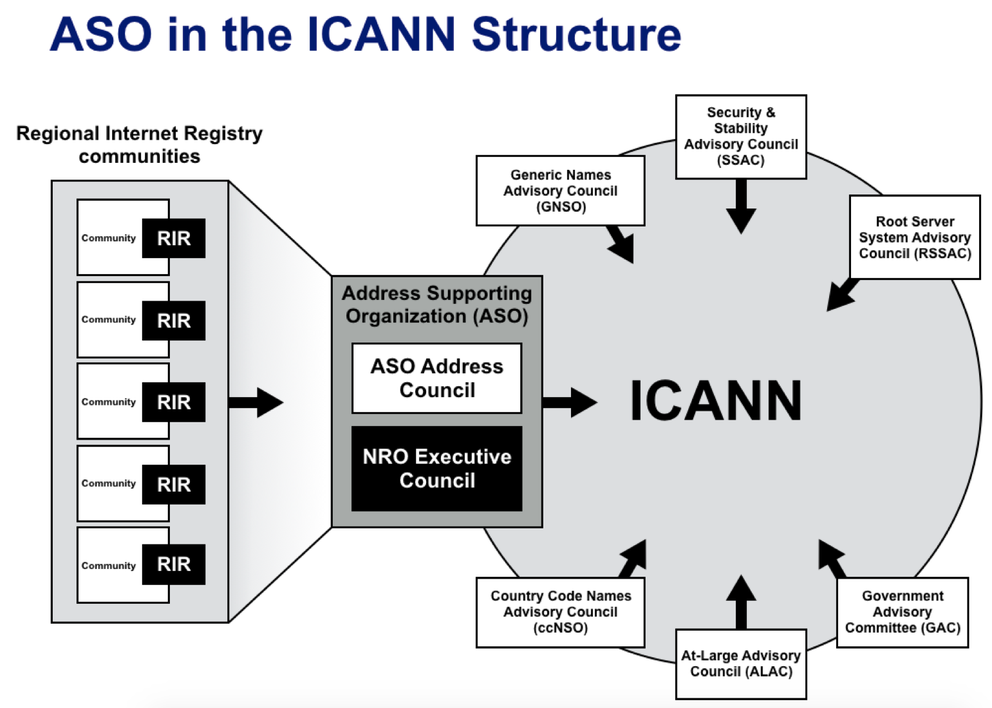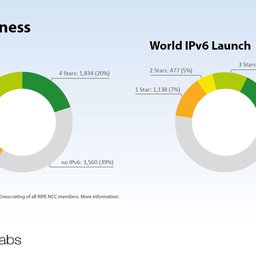The five Regional Internet Registries (RIRs) are asking their communities for guidance on how they should participate within ICANN in the future. In this article, we provide some much-needed context around this issue.
In a Nutshell
In 2017, ITEMS, an independent consultancy, conducted a review of the Address Supporting Organization (ASO). The review found that the ASO is one of the better-organised and efficient parts of the ICANN system, is transparent and accountable, and is viewed by many as a critical part of the ICANN structure.
The review concluded with 18 recommendations, the first 17 of which are well defined and practical, and can be implemented by the NRO Secretariat or the ASO Address Council, with respect to administrative procedures, documentation, or in some cases adjustments to agreements that are expected to be non-controversial.
The final recommendation of the review was that the NRO should initiate a public consultation with the five RIR communities, to decide on the future structure of the ASO. The Executive Council of the Number Resource Organization (NRO) accepted this recommendation and decided to launch a consultation based on the issues identified in the review. This is where we are today.
What is the Address Supporting Organization (ASO)?
For those unfamiliar with the world of ICANN, it’s worth explaining a little about what the ASO does.
Within the ICANN structure, there are three Supporting Organizations (SOs) and four Advisory Committees (ACs). The SOs develop and recommend Internet policies within their areas of expertise, while ACs provide input to the ICANN Board.
The ASO represents the Number Community within the ICANN system. Its main functions, as identified in its MoU with ICANN (known as the ASO MoU), include:
- Forwarding global policy proposals to the ICANN Board for ratification once the five RIR communities have reached consensus on them (this the ASO’s primary function)
- Providing recommendations to the ICANN Board regarding the recognition of new RIRs
- Electing two seats on the ICANN Board
- Reviewing the process regarding how the RIRs reach agreement on global policies
In terms of who serves on the ASO, it’s made up of two parts:
- The ASO Address Council (AC), which as a function within the ICANN structure is performed by the NRO Number Council (NC) (if this is confusing, this page might help to clarify). The ASO AC / NRO NC is made up of three community members from each of the five RIR service regions.
- The NRO Executive Council (EC) which is made up of the Managing Directors of the five RIRs.

The Review of the ASO
There is a requirement in the ICANN bylaws that SOs and ACs be reviewed periodically. Before this latest review, the last (and only) review of the ASO was in 2011. The goal of the review in 2017 was to determine whether:
- The ASO has a continuing purpose in the ICANN structure, and if so, whether any change in the structure or operations of the ASO is desirable to improve its effectiveness in the ICANN structure
- The ASO is accountable to the Internet Number Community when carrying out its responsibilities
The outcome of the review was positive:
“Our findings suggest that the ASO is one of the lesser-known Supporting Organisations within ICANN. Yet, at the same time, it is widely perceived to be one of the better-organised and efficient parts of the ICANN system. A majority of interviewees, including ICANN Board Members, ICANN Executive Staff, NRO/RIR leadership and the ASO Address Council itself, expressed broadly favourable views regarding the way in which the ASO conducts its operations, and a high degree of confidence in its leadership structures.”
- ITEMS, 2017
The review also found that the ASO operates in a transparent manner and still performs a critical function within ICANN.
So, What’s the Issue?
When the IANA transition was completed in 2016, a new structure within ICANN was created, called the Empowered Community. The Empowered Community is made up of all three SOs and two ACs
- Address Supporting Organization (ASO)
- Country Code Names Supporting Organization (ccNSO)
- Generic Names Supporting Organization (GNSO)
- At-Large Advisory Committee (ALAC)
- Governmental Advisory Committee (GAC)
The Empowered Community has a number of powers that it can use to keep ICANN accountable. These include things like rejecting the ICANN budget and strategic plan, recalling the ICANN Board, and the right of inspection and investigation (there are nine powers in total).
From an accountability point of view, it’s great that ICANN’s community has been “empowered” in this way. However, the ASO is increasingly being asked to perform a not-insignificant amount of administrative work to fulfil its role as a part of this new structure, and also more generally as ICANN has come to require more in terms of ASO involvement over time.
Given the very low level of practical engagement between the ASO and ICANN, the Number Community might consider that the demands placed on it by participating in the Empowered Community are disproportionate.
The question the Number Community now needs to ask itself is this: what kind of role does it want to play within ICANN going forward? The final report identified three key options – though these are by no means the only ones.
Option 1: “Status Quo and Just Say No”
The NRO EC would tightly scope the ASO to only matters relating to the Number Community. Essentially, it would stick to the narrow scope in the existing MoU it has with ICANN, reserving the right to determine what it feels is in scope.
One drawback is that this would likely create misaligned expectations between what ICANN expects from the ASO in terms of its new role as part of the Empowered Community and what the Number Community expects from the ASO, based on the current MoU.
This also means that the NRO EC will continually need to make decisions on a case by case basis about how it will perform the various roles relating to the ASO’s function as part of the Empowered Community.
Option 2: Status Quo + Increased ASO AC / NRO EC Coordination
Coordination between the ASO AC and NRO EC could be enhanced, and the annual joint meeting between these two bodies could be formalised. This wouldn’t require any real changes, but it would better highlight and distinguish between the roles of the NRO EC and the ASO AC.
Option 3: Adoption of a Two House “ASO Council”
This would involve establishing that the ASO is comprised of both a “Policy House” (ASO AC) that focuses on global policy proposals and appointing people to the ICANN Board, and a “Registries House” (NRO EC) that is responsible for contractual, coordination and other operational matters with ICANN.
This approach wouldn’t result in any functional changes – but it would highlight the two main channels through which the Number Community engages with ICANN. It also takes into account that the NRO, when acting as the ASO, routinely conducts activities that were not originally planned when the ICANN bylaws were drafted and the current version of the ASO MoU was signed.
Consulting the Number Community
The NRO EC is now looking for specific answers to the following questions:
- What adjustments, if any, should be made in order to address the issues described above?
- Should adjustments be limited to the NRO MoU, ASO MoU, and/or the ICANN Bylaws
- Over what timeframes should these adjustments be developed and implemented
- What strategic aspects should we pay attention to when considering these adjustments?
The scope of the consultation includes the structural implications of the issues identified by the ASO Review, including but not limited to:
- Any updates and adjustments identified as required for ASO-related documents
- Any procedural clarifications and adjustments identified
- Reported confusion of roles between the ASO and NRO, and their components
- Perceived complexity of relationships among the NRO, ASO and ICANN
- Relevance and cost to the RIRs of various ICANN engagement activities
Out of the scope of this consultation are the following aspects:
- The Global Policy Development Process (GPDP)
- The ASO AC’s role with the GPDP
Next Steps
We are now interested in hearing from the RIPE community how it thinks the ASO should function within ICANN. Please share your comments on the RIPE Community Discuss mailing list (ripe-list@ripe.net) until 30 June 2018.
For those interested in hearing more about this issue, we will be presenting in the Address Policy Working Group at RIPE 76 on 16 May 2018 (remote participation options will be available).
We will report back to the RIPE community on the input we receive, and the progress the NRO EC makes as it collates the input from the five RIRs.




Comments 0
The comments section is closed for articles published more than a year ago. If you'd like to inform us of any issues, please contact us.